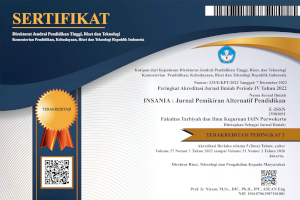SELF-EFFICACY DALAM PEMBELAJARAN MATEMATIKA SISWA MADRASAH ALIYAH
DOI:
https://doi.org/10.24090/insania.v24i1.2808Keywords:
self-efficacy, mathematics, cooperative learningAbstract
Self-efficacy of students plays a role in determining student success in learning, including learning mathematics. Affective aspects such as self-efficacy, play a major role when students work and use mathematics, because to be able to solve mathematical problems is not enough just to know how to do it, but must be accompanied by self-efficacy about the truth of the concepts and procedures they have. This research was conducted in two groups of students using an instrument in the form of a questionnaire to measure students' self-efficacy. Observation data collection techniques were also conducted to determine the learning process of the two groups. The results showed that groups of students who used active and cooperative learning had higher self-efficacy. Keywords: self-efficacy, mathematics, cooperative learning.Downloads
References
Ahmad, Alay dan Safaria, Triantoro. 2013. Effects of Self-Efficacy on Students’ Academic Performance, dalam Journal of Educational, Health and Community Psychology. Vol. 2, No. 1
Azwar, Saifudin. 2015. Penyusunan Skala Psikologi. Yogyakarta: Pustaka Pelajar.
Bandura. 1997. Self-Efficacy: The Exercise of Control. New York: W.H. Freeman and Company.
Direktorat Jenderal Pendidikan Dasar dan Menengah Departemen Pendidikan Nasional RI. 2003. Pendekatan Kontekstual (Contextual Teaching and Learning). Jakarta: Ditjen Dikdasmen Depdiknas.
Finney, S. J., & Schraw, G. 2003. Self-efficacy beliefs in college statistics courses. Contemporary Educational Psychology, 28, 161-186.
Gal, I. dan Ginsburg, L. 1994. The Role of Self efficacys and Attitudes in Learning Statistics: Towards an Assesment Framework. Journal of Statistics Education, 2(2)
Gal, I., Ginsburg, L., & Schau, C. 1997. Monitoring Attitudes and Self efficacys in Statistics Education. In I. Gal & J. B. Garfield (Eds.), The assessment challenge in statistics education (pp 37-51). IOS Press.
Garfield, J., dan Ben-Zvi, D. 2009. Helping Students Develop Statistical Reasoning: Implementing A Statistical Reasoning Learning environtment. Teaching Statistics, Vol 31, No. 3.
Gurefe, Nejla dan Bakalim, Orkide. 2018. Mathematics Anxiety, Perceived Mathematics Self-Efficacy and Learned Helplessness in Mathematics in Faculty of Education Students, International Online Journal of Educational Sciences, Vol. 10, No. 3
Hall, S. dan Vance, E. A. 2010. Improving Self Efficacy in Statistics: Role of Self-Explanation & Feedback. Journal of Statistics Education, 18 (3).
Ibrahim, dkk. 2000. Pembelajaran Kooperatif. Surabaya: UNESA-University Press.
Johnson, B. Elaine. 2007. Contextual Teaching & Learning Menjadikan Kegiatan Belajar-Mengajar Mengasyikkan dan Bermakna. Bandung: MLC
Komalasari, K. 2010. Pembelajaran Kontekstual: Konsep dan Aplikasi. Bandung: PT Refika Aditama.
Lee, C., Zeleke, A., and Meletiou, M. 2003. A Study of Affective and Metacognitive Factors for Learning Statistics and Implications for Developing an Active Learning Environment. Tersedia: http://ciillibrary. org:8000/ciil/Fulltext/International_Journal_of_Educationa_Research/Article4.pdf. [11 Agustus 2010].
Perepiczka, M., Chandler, N., dan Becerra, M. Relationship between Graduate Students’ Statistics Self-Efficacy, Statistics Anxiety, Attitude toward Statistics, and Social Support. The Professional Counselor: Research and Practice, Vol 1, No 2, 2011.
Purnamasari, Vita, Sundari, Sri dan Suryandari, Galuh. 2016. Peningkatan Hasil Belajar Kognitif dan Harga Diri mahasiswa melalui Metode Cooperative Learning Tipe Jigsaw, Indonesian Journal of Nursing Practices, Vol 1, No 1
Qadar, Riskan, Nuryani Y. Rustaman, dan Andi Suhandi. 2015. Mengakses Aspek Afektif dan Kognitif pada Pembelajaran Optika dengan Pendekatan Demonstrasi Interaktif, Jurnal Inovasi dan Pembelajaran Fisika, Vol. 2, No. 1
Risnanosanti 2010. Kemampuan Berpikir Kreatif Matematis dan Self-Efficacy terhadap Matematika Siswa Sekolah Menengah Atas (SMA) dalam Pembelajaran Inkuiri. Disertasi pada SPs UPI: Tidak Diterbitkan.
Schunk, D. H. 2012. Learning Theories: An Educational Perspective. Yogyakarta: Pustaka Pelajar.
Stahl, 1994. Cooperative Learning in Social Studies. New York: Addison Wesley Publishing Company
Suryanto. 2002. Penggunaan Masalah Kontekstual dalam Pembelajaran Matematika. Naskah Pidato Pengukuhan Guru Besar. Yogyakarta: UNY
Ulpah, Maria. Penggunaan Konteks dalam Pembelajaran Statistika. Prosiding Seminar matematika UNY, November 2010.
Yuliarti, Khanafiyah dan Putra. 2016. Penerapan Strategi Pembelajaran Generative Learning Berbantuan Scientist’s Card untuk Meningkatkan Self-Efficacy Siswa Kelas VIII SMP, Jurnal Pendidikan Fisika Indonesia, Vol. 12, No. 1
Downloads
Published
How to Cite
Issue
Section
License
Authors who publish with this journal agree to the following terms:
Authors retain copyright and grant the journal right of first publication with the work simultaneously licensed under a Creative CommonsAttribution-ShareAlike License that allows others to share the work with an acknowledgment of the work's authorship and initial publication in this journal.
Authors are able to enter into separate, additional contractual arrangements for the non-exclusive distribution of the journal's published version of the work (e.g., post it to an institutional repository or publish it in a book), with an acknowledgment of its initial publication in this journal.
Authors are permitted and encouraged to post their work online (e.g., in institutional repositories or on their website) prior to and during the submission process, as it can lead to productive exchanges, as well as earlier and greater citation of published work (See The Effect of Open Access).








